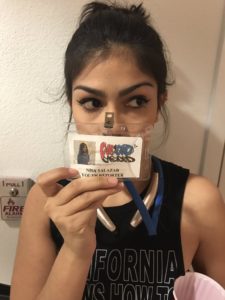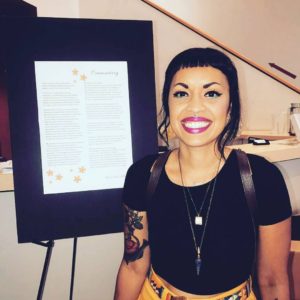Image via Claudia Jo
Editor’s Note: Over the weekend, We’Ced hosted ‘#SchoolsnotPrisons Merced,’ a family-friendly event design to educate the Merced community about the impacts of the school-to-prison pipeline and mass incarceration. A portion of the event included an art gallery showcasing artwork and poetry by local youth and artists. Below are the poems for your enjoyment.
On Our Side of The System
As a little girl, my weekends were spent at the infamous ‘California Youth Authority.’
It was “YA,” the place my uncle was going to “school,” but I was no fool.
It was a baby prison. A place you sent kids who did not listen.
To step foot inside you must be checked from head to toe.
My mom always told me, “it’s ok we are going to see Tio in a minute.” But it felt like an eternity before I could see him.
Feelings of discomfort, CO’S checking and looking at me and my family, thinking we belong there.
I was scared. The system didn’t care. Incarcerating babies wasn’t fair.
Vending machines everywhere. My uncle eating as if he hasn’t eaten a good meal in days.
Twirling my hair, seeing the sad look in everyone’s eyes. They knew the system did not CARE.
The outside area had one lonely slide, I knew then, as a little girl, that the system wasn’t on our side.
No youth should spend their childhood behind bars. Give them a chance at life. Let’s fight to get the system on our SIDE.
–Nisa Salazar, We’Ced Youth Reporter

_______________________________________________________________________
La Sopa: My Incarcerated Noodles
Add limon and tapatio, and now this famous Asian dish has a unique Mexican twist.
With every spoonful I can taste my freedom.
Only 25 cents on the streets, but to buy one sopa in here, it takes working long hours on your feet.
I am helluva chef when I prep this ramen dish.
Share with the homies or hustle to make ends meet, these sopas I eat bring me fond memories.
Counting the days, but time goes by slowly.
No visits from the family. No letters. I’m lonely.
Only concrete walls, and feelings of defeat.
These incarcerated noodles have me fiening for the streets.
But with every spoonful I take, I can taste my freedom. With every sopa I eat, it’s a whole new dia.
It’s hard to imagine I’ll be home one day. These sopas bring me comfort, they also mask my pain.
–Claudia Jo (Gonzalez), We’Ced Program Manager

_______________________________________________________________________
Commentary
I didn’t want to write this poem.
I have too many things to say on the subject, and to
too many people.
I’ll tell you I looked my name up
recently, its something I do periodically,
to see what shows up. I found some 10+ arrests
on the initial search. I didn’t even bother with
aliases or convictions. Suffice it to say,
court records will outlive us all.
My fines followed me for over a decade, refusing the
possibility of swift removal. Money has never come
easy for my family, not enough funds to pull from.
I was positive when I opened a bank account that
my name would raise flags, I distinctly recall larceny
charges that never resulted in convictions.
Paranoia has always come easy for my family,
we have too many examples to pull from.
I resisted the urge to run when the woman
walked away with my ID. There are things to
take for granted, and things to not.
My mother would give you a list of reasons
I didn’t belong in jail. Her ability to overlook fact
and circumstance (evolving from a long line of co-
dependency, addiction, and struggle) was remarkable
and necessary for her at the time.
She visited me every weekend, dutifully putting her hard
earned money on my books. I have thanked her more times
than I can count for her dedication.
My father knew better.
His past was etched onto his skin while inside,
like a predetermined fate for his offspring.
He refused to see me while I was in there.
The industrial strength cleaner, the process for visits,
the armed guards, the controlled time and foods,
they held too many memories for him.
I don’t fault him for this.
They had hoped that a geographic, that homeownership
in an agricultural town far from the city, would
shield us. Afford their next generation a new life.
But my blood, my inclinations, they told a different story.
And institutional memory runs deep, history reaches out
for us, past what we can see.
I think you expect me to apologize.
For the goods that I stole, for the crimes I committed.
That if I had to do it all again, my story wouldn’t
involve jail. But the truth is: I’m not sorry.
I refuse to make it that easy for you. I didn’t build
this system, made to house bodies so like my own.
Those decisions were made long before I came into the picture.
My past has become experiential knowledge,
not easily commodified. It is mine to own, to do with
as I will. I share it collectively, with those that
came before me, that haven’t left, and the inevitable
future holders. It is armed with this awareness
that I hold this pen, that I walk these streets,
that I work for my community.
Forgetting is not an option, and apologies
are not for me to make.
–Tina Curiel-Allen, Co-Founder of Beyond the Stats

 Translate
Translate
